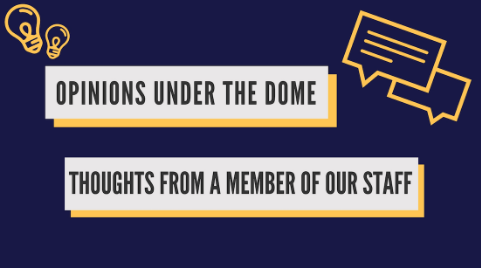Opinions under the dome: the benefits of stress

For most people, stress holds a negative connotation. From as early on as fifth or sixth grade, kids are taught that stress is something that needs to be minimized and coped with. To do that, we use stress balls and fidget cubes or perhaps do yoga and meditate. There’s an entire industry whose sole purpose is to sell stress-reducers to consumers. However, despite all of the negativity stress holds, some sources claim you don’t need to reduce stress and that-to an extent-stress can be good.
According to Kelly McGonigal, a Stanford psychologist, people have a tendency to become nicer, not more aggressive, when stressed.
“In times of stress, both men and women have been shown to become more trusting, generous, and willing to risk their own well-being to protect others,” McGonigal said.
McGonigal found is that this “niceness” springs from what she calls the “tend-and-befriend response.”
“A tend-and-befriend response makes you social, brave, and smart. It provides both the courage and hope we need to propel us into action and the awareness to act skillfully,” McGonigal said.
The tend-and-befriend response isn’t the only positive thing to come out of stress.
According to healthguidance.org, “Stress is actually a cognitive enhancer which can boost several aspects of our mental prowess and help us in professional and academic capacities.”
Part of what causes you to experience a cognitive boost is that stress also increases your memory.
According to Serusha Govender at CNN.com, “Acute stress increases your brain’s ability to encode and recall traumatic events, according to studies.”
All these positive benefits aren’t without their detractions, however. Stress can most definitely be bad. Chronic stress that causes ever-present anxiety is an issue that is more prevalent than ever among today’s teens. What we shouldn’t be afraid of, however, is a bit of acute stress every once in a while. This acute stress is what drives us to do things.
According to a study led by Roy Baumeister in 2013, “People who had experienced the highest number of stressful life events in the past were most likely to consider their lives meaningful. People who said they were under a lot of stress right now also rated their lives as more meaningful. Even time spent worrying about the future was associated with meaning.”
This association with stress and meaning is powerful, because it means that you can live your life without stressing out about stress. All too often people are stressed about the fact that they’re stressed, and all it’s doing is harming them further. If we all just took a step back, we would realize that the very presence of stress means that we are doing something meaningful, because we wouldn’t be stressed over something we don’t care about.
Overall, I feel that people stress out over stress too much. If people stopped viewing it as something that could kill them, and that they have to stop it at all costs, we’d all be less stressed.
As Kelly McGonigal put it, “We rarely get to choose the stress in our lives, and it isn’t realistic to think we can avoid stress. Given that life is going to be stressful, what do you gain by focusing on the fear that the reality of your life is killing you?”
By: Canaan Smith









